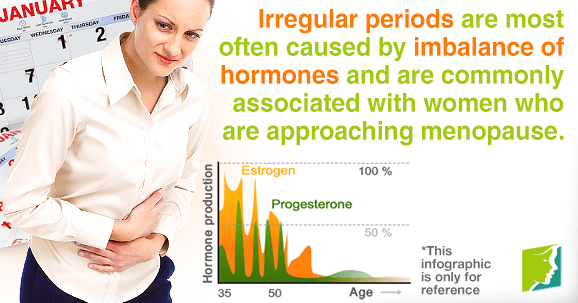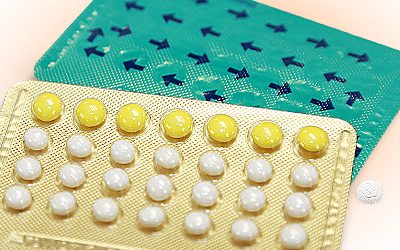Irregular periods are a common symptom of menopause, and only 10% of women reach menopause without having experienced irregular periods. Irregular periods are most often associated with pregnancy. However, irregular periods and their causes are also common during perimenopause and puberty, and can also be a symptom of certain medical conditions, medications, and lifestyle factors.
Principal Cause of Irregular Periods
The menstrual cycle is controlled by the body's hormones. Hormones are produced by the endocrine system, and the part of the endocrine system that produces the sex hormones estrogen and progesterone, which are involved with the menstrual cycle, is the ovaries. This means that irregular periods can be a reflection of a larger change happening in the body, such as menopause, pregnancy, or an underlying medical condition. Irregular periods are any deviation from what a woman normally experiences during her menstrual cycle. Symptoms can include a change in the frequency, duration, and flow of your periods.
Irregular periods commonly happen to women who are approaching menopause. If a woman is between her mid-40s and 50s and is experiencing irregular periods, it's possible that she may be in perimenopause, the stage before menopause. During this time, a woman's body is preparing to cease menstruation, and as a result, hormone levels fluctuate and periods become irregular.
The Role of Hormones in Irregular Periods
Hormones such as estrogen and progesterone naturally fluctuate throughout the menstrual cycle and also change throughout a woman's life. However, disruptions to these cycles can cause irregular periods.
Estrogen
Estrogen thickens the uterine lining before ovulation. As levels of estrogen constantly change during menopause, the uterine lining is often shed irregularly, which is one of the causes of irregular periods.
Progesterone
Progesterone is an important hormone during pregnancy. During the menstrual cycle, progesterone prepares the uterus to receive a fertilized egg. If this does not happen, progesterone levels decrease, which signals the body to break down the uterus lining that was being built. The lining is shed in a period.
Prior to settling at lower levels at menopause, estrogen and progesterone levels can fluctuate significantly and make women's periods irregular. However, menopause is just one reason a woman could be experiencing irregular periods.
Other Causes of Irregular Periods?
Outside of puberty, pregnancy, and menopause, irregular periods can be caused by:
Health conditions
- Eating disorders
- Polycystic ovary syndrome (PCOS)
- Uterine abnormalities (fibroids, cysts, polyps, endometriosis)
- Irritable bowel syndrome (IBS)
- Tuberculosis
- Recent birth, miscarriage, or dilation and curettage procedure (D&C)
- Liver disease
- Diabetes
- Cancer
- Anemia
- Thyroid dysfunction
Lifestyle triggers
- Weight gain or loss
- Excessive exercising
- Poor diet
- Smoking
- Drug use
- Caffeine and alcohol addiction
- Increased stress
- Certain medications
- Breastfeeding
If you are experiencing irregular periods, are are not sure what is causing them, or are also experiencing additional symptoms, it is important to talk to your healthcare provider. It is also important to see a doctor if you are postmenopausal and have irregular bleeding, because there is a chance this could be a sign of a serious medical condition. Click on the following link for more information on treating irregular periods.
Sources
- American Congress of Obstetricians and Gynecologists. (2015). Perimenopausal Bleeding and Bleeding After Menopause. Retrieved from http://www.acog.org/Patients/FAQs/Perimenopausal-Bleeding-and-Bleeding-After-Menopause
- National Women's Health Resource Center. (2015). Progesterone. Retrieved from http://www.healthywomen.org/condition/progesterone




